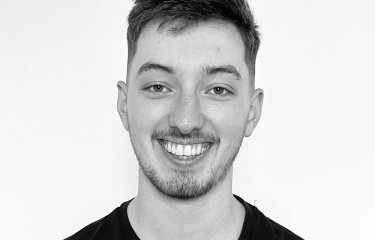Communication Design Grad Presents AI Research at MIT
29 November 2019

MA Communication Design graduate Sekyeong Kwon recently presented a paper at DeSForM19, the conference for design and semantics of form and movement, at the Massachusetts Institute of Technology (MIT).
Sekyeong's paper - Speculating on the Future of Graphic Design in the Age of Intelligent Machines – is based on her final MA degree project, which explores the relationship between humans and machines.
We caught up with her to find out more...
Why did you write this paper?
Speculating on the Future of Graphic Design in the Age of Intelligent Machines is a short paper that Dr Robyn Cook, MA Communication Design Senior Lecturer, and I collaborated on after my Master's final project.
There are so many articles out there how machine learning will have a profound impact on the future, yet despite its proximity, graphic design education and practice are largely side-lined from participating in the discussion. Within this context, I set out to discuss some of the cultural and practical implications of AI-powered design, from a graphic design perspective.
Tell us about your project's persona Michael Barnes
Michael Barnes is the name of a designer that I created for my Master's final project.
Michael Barnes is a fake persona generated by the computer algorithm collaborated with a human, myself, as an experiment to speculate and invite people to think about the future of design in the age of intelligent machines.
Every text on his website including his name, biography, manifesto and project blurb are entirely not real. 'He' has been computationally generated using a combination of tools (Python coding, Markov Chain sequencing, existing image generators, etc.) and data 'scraped' from various materials and websites. Thus, Michael Barnes represents one randomised version of a potentially exponential number of 'designers' and 'portfolios' that could have been algorithmically generated.
What does it mean to you to have been chosen to present at the conference?
During my Masters, I was passionate about emerging tech and how we interact with it. One of the goals for my final project was to provoke thoughts about the future when AI plays a critical part in the design industry. It meant a lot to be part of this year's DesForM because I was proud to be able to showcase my work and represent Falmouth University alongside students from across the world.
Moreover, the conference focus - designing beyond intelligence - was very relevant to my project by exploring the diverse topics around the advancement of technology and its implication in the practice of design.
What did you tell the audience at MIT?
I was there to showcase my Master's work through a poster and interactive prototype of the project. It was an incredible opportunity to meet people with similar interests, to share insights and discover the fascinating work being done in the field by people all around the world.
The most exciting part was having people come up to discuss my work. There were so many different perspectives on AI and the future of design and Michael Barnes triggered so many diverse and passionate conversations.
What will you be doing next?
After graduating from Falmouth, I moved to London to start my career in design. I've worked in wildly different companies including a small design innovation studio to big design consultancy working on various projects across AI ethics to diverse client projects.
Following my interests in human-computer interaction, I now work in a tech start-up designing user experience and interface. In my spare time, I'm collaborating on a side project curating resources on AI for people who work in the product such as UX/UI designers, engineers and product managers.
Anything else you want to say about the conference or the course?
I feel so grateful to have had the opportunity to visit MIT and to display my work as a result of my time on MA Communication Design at Falmouth.
Something that has stood out for me is the strong connection I feel with my course as an alumnus and the great support received from our tutors during the course even after graduation. In particular, none of this would have been possible without my tutor Robyn Cook for all her guidance and collaboration on the project.




